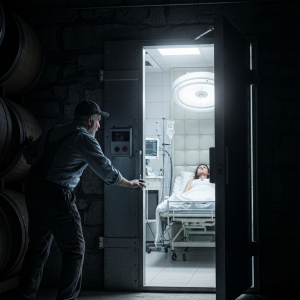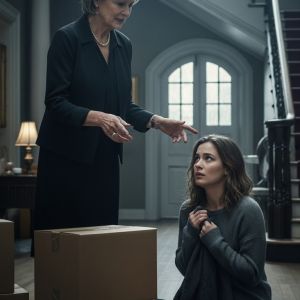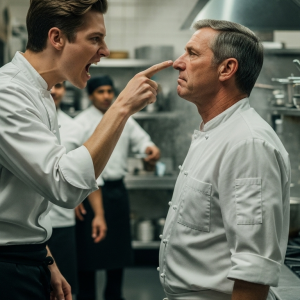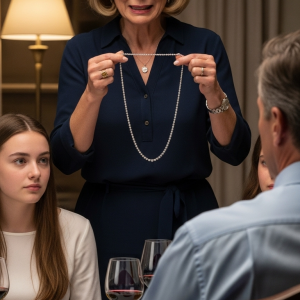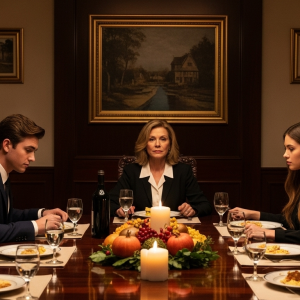The soul of Napa Valley isn’t in the opulent tasting rooms or the Michelin-starred restaurants that dotted Highway 29. It was in the dirt. Isabelle de la Cour knew this. She could crumble the loamy soil of her vineyard between her fingers and tell you the story of the coming vintage—a language of sun, soil, and rain that her family had spoken for three generations. Her winery, Château de la Cour, was a bastion of tradition, a place where wine was made not with algorithms and additives, but with patience and a profound respect for the land.
Her son-in-law, Julian Chevalier, spoke a different language entirely. His was a vocabulary of foams, gels, and deconstructions. As a celebrity chef with two television shows and a line of branded cookware, Julian was a master of the modern, a culinary supernova who saw tradition as a cage. He loved Isabelle’s daughter, Elena, but he viewed Isabelle’s methods with a thinly veiled condescension.
Tonight, that condescension was on full display at the annual harvest dinner. Seated at the long oak table in Isabelle’s rustic but elegant farmhouse, Julian held a glass of her award-winning Pinot Noir up to the light.
“The aromatics are… charming, Isabelle. Truly,” he began, the word ‘charming’ landing with the weight of a minor insult. “It has a certain rustic honesty. I was just telling Elena, with the right micro-oxygenation and a bit of tannin management, you could really elevate this to a more… contemporary palate.”
Isabelle smiled, a serene, placid expression that betrayed nothing. “The only ‘management’ this wine needs, Julian, is from the sun and the soil. It is not a product to be engineered. It is a story to be told.”
Elena, ever the diplomat, squeezed her husband’s arm. “What Dad is trying to say is that he’s always thinking about how to push things forward, Mom. It’s what makes him brilliant.”
Julian flashed a brilliant white smile. “Exactly. And speaking of pushing forward,” he announced, his voice taking on a performative tone, “I have some exciting news. I’ve decided to enter this year’s International Vintner’s Guild competition.”
A polite silence fell over the table. Julian wasn’t a winemaker.
“I’ve partnered with Apex Vineyards,” he explained, naming a massive, corporate wine producer known for its industrial efficiency. “We’re creating a proprietary red blend. A chef’s wine. Something bold, aggressive. A statement.” It was an unspoken challenge, a direct shot across Isabelle’s bow. He wasn’t just entering her world; he was planning to conquer it with the very philosophy she despised.
Later that night, long after Julian and Elena had left, Isabelle sat alone in her office overlooking the moonlit vines. She picked up the phone. It was not to her vineyard manager or her daughter. It was to the head of her security firm.
“Michael,” she said, her voice quiet but firm. “I want a full upgrade on the cellar system. Everything. High-definition, thermal, and low-light capabilities. I want every barrel under surveillance, and every angle covered. And I want it done by Tuesday.” She knew her son-in-law. She knew the hungry, envious look in his eyes. Ambition like his, she had learned long ago, often left integrity behind.
A week before the competition submission deadline, Julian’s sleek black sports car crunched up the gravel driveway of the château. He emerged with a case of champagne, a peace offering. “A little something to celebrate our friendly competition,” he said to Isabelle, his smile never quite reaching his eyes. He had come, he claimed, to “soak up some of the old-world wisdom.”
Isabelle gave him the tour he requested, walking him through the cool, damp barrel room. The air was thick with the sweet, heady scent of aging wine—the angel’s share. Julian asked seemingly innocent questions about fermentation temperatures, yeast strains, and the specific French oak barrels she used for her prize vintage, a small-batch Cabernet Sauvignon she simply called “Héritage.”
“This is the one, isn’t it?” Julian said, running a hand almost caressingly over the smooth oak of the barrel marked for the competition. “The one that wins all the awards. What’s the secret, Isabelle?”
“There is no secret, Julian,” she replied, her gaze steady. “Only time, and care, and honest work.”
That night, the honesty of Château de la Cour was violated. The new security system, invisible to the naked eye, captured everything in stark, monochrome detail. The footage showed a shadowy figure slipping through a side door Julian had discreetly left unlocked earlier. It was him.
The infrared camera recorded the scene with an eerie, clinical detachment. Julian moved with a quiet, predatory confidence through the silent cellar. He went directly to the Héritage barrel. From his jacket, he produced a small, clear vial containing a liquid. He expertly uncorked the barrel’s bunghole, his movements quick and precise.
The camera captured the moment of desecration in perfect, damning clarity: he tilted the vial and poured its contents into the heart of Isabelle’s masterpiece. It was a specialized, cultured strain of Brettanomyces—a rogue yeast that wouldn’t immediately spoil the wine, but would subtly corrupt it over the next few days. It would flatten the complex fruit notes, introduce a faint, unpleasant sourness on the finish, and turn a symphony of flavor into a discordant mess. It was an act of sabotage only a true expert could devise. He sealed the barrel, wiped the surface clean, and slipped back into the night, a ghost of malice.
The next morning, Isabelle sat in her office before dawn, the only light coming from the security monitor. She watched the silent, black-and-white film of Julian’s betrayal. Her face, illuminated by the screen’s glow, showed no anger, no shock. There was only a profound, weary sadness, the look of a woman whose worst suspicions had been confirmed. She had seen this kind of ambition before, the kind that consumes a person’s soul.
She did not call the police. She did not call her daughter to unleash her fury. She did not confront Julian. Her plan was far more strategic, far more patient. She calmly downloaded the video file, encrypting it and saving it to a small, secure flash drive. Then, she composed a short email to her old and trusted friend, Charles Devereaux, the president of the International Vintner’s Guild.
Charles, A situation has arisen. I will be submitting my Héritage as planned, but I need you to hold onto the attached file. Please do not open it under any circumstances until I give you the signal. The signal will be when Julian Chevalier thanks me in his acceptance speech. Trust me. Yours, Isabelle.
Her daughter, Elena, was in a panic a few days later when the final lab reports came back from the pre-submission tasting. “Mom, we can’t submit the Héritage! The lab says there’s a Brettanomyces bloom starting! The profile is off, the phenolics are degrading! It will be disqualified, or worse, laughed at!”
Isabelle simply placed a calming hand on her daughter’s arm. “We will submit it anyway,” she said softly.
“But why?” Elena pleaded, her face a mask of confusion and distress. “It will ruin your reputation!”
Isabelle looked out the window at the old, gnarled vines that had survived for generations. “Sometimes, Elena,” she said, her voice filled with a chilling calm, “you must allow a flawed thing to reveal its own truth. Let’s just let the competition play out naturally.”
The Grand Ballroom of the San Francisco Ritz-Carlton was a glittering spectacle of power and influence. The most famous winemakers, critics, and sommeliers in the world were gathered for the Vintner’s Guild Awards. The air was electric with tension and ambition. Isabelle sat at her table, the picture of quiet dignity. Julian and Elena sat at the Apex Vineyards corporate table, where Julian was holding court, soaking in the adulation.
The awards for Cabernet Sauvignon were announced. Isabelle’s Héritage was not mentioned. It didn’t even place. A ripple of surprise went through the room. A camera panned to Isabelle, but she simply took a placid sip of water. Across the room, Julian allowed himself a small, smug smile.
The final award of the evening was for Best New Proprietary Blend. The presenter tore open the envelope. “And the Gold Medal goes to… ‘Inferno,’ by Chef Julian Chevalier and Apex Vineyards!”
The table erupted. Julian rose, kissing Elena deeply as flashbulbs went off around them. He strode to the stage, his walk a swagger of pure triumph. He accepted the heavy gold medal, holding it up for the crowd to admire. He tapped the microphone, and his smooth, confident voice filled the hall.
He thanked his partners at Apex. He thanked the judges for their discerning palates. And then, he turned his speech to philosophy. “This award isn’t just for me,” he proclaimed, his voice dripping with arrogance. “It’s a victory for innovation. It’s proof that a new generation, unburdened by the dusty, tired traditions of the past, is ready to take its rightful place at the head of the table.”
He paused, letting the implicit insult hang in the air. Then he smiled, a predator’s smile.
“And finally, I must thank my mother-in-law, Isabelle de la Cour,” he said, his voice laced with saccharine irony. “In her own way, she has inspired me to be so much better.”
It was the signal.
In the control booth, Charles Devereaux nodded to his technician.
On the massive screens flanking the stage, the logo of the competition suddenly vanished. It was replaced by silent, grainy, black-and-white footage. Julian’s amplified voice was cut off mid-sentence.
The entire hall fell silent. Every head turned to the screens. They saw the familiar setting of the de la Cour cellar. They saw a figure slip from the shadows. They saw Julian Chevalier, their new Gold Medalist, uncork Isabelle’s barrel and poison her wine. The video played on a silent loop, the act of sabotage repeating itself, undeniable and damning.
The only sound in the vast ballroom was the collective, sharp intake of breath from a thousand horrified guests.
Julian stood frozen on the stage, the gold medal still in his hand, his triumphant smile now a grotesque, twisted mask of disbelief. The face on the screen was his. The crime was his. There was no escape. The silence in the room curdled into a low murmur of disgust, then a roar of condemnation.
Charles Devereaux, his face a thunderous mask of fury, strode onto the stage. He walked directly up to Julian, who seemed to have turned to stone. Without a word, Charles took the gold medal from Julian’s limp hand, the clink of metal against the podium microphone echoing like a gunshot.
In the audience, Elena watched, her face a canvas of utter devastation. The missing dress, her mother’s strange calm, her husband’s subtle cruelty—it all clicked into place in one horrific, soul-crushing moment. The man she loved was a fraud, a cheat, a saboteur. Tears streamed down her face, tears of grief and rage.
The destruction was swift, total, and public. Julian was escorted off the stage in disgrace. Backstage, Elena made the phone call that ended her marriage. “Don’t come back to the hotel, Julian,” she said, her voice hollow and dead. “Don’t ever come near me or my mother again. It’s over.”
The fallout was a media firestorm. The headlines were brutal: CHEF CHEVALIER STRIPPED OF MEDAL IN SHOCKING SABOTAGE SCANDAL. THE POISON IN NAPA’S HEART. Investors in his restaurant empire pulled out overnight. His television network immediately suspended his shows. The culinary and winemaking worlds, built on reputation and trust, slammed their doors in his face. He had become a pariah, his brilliant career incinerated on the altar of his own jealousy.
The ceremony was in chaos, but Charles Devereaux returned to the microphone, calling for order. “Tonight,” he announced, his voice booming with authority, “we have witnessed an act of profound dishonor. But we will not let it be the final word. The Guild would like to rectify this by presenting a special, unprecedented award.”
He looked directly at Isabelle, who had watched the entire spectacle with a somber grace. “For her unwavering integrity, her quiet strength, and a lifetime dedicated to the honest art of winemaking, the International Vintner’s Guild presents its Lifetime Achievement Award to Isabelle de la Cour.”
The room erupted in a thunderous, sustained standing ovation. Isabelle walked to the stage and accepted the award, not with triumph, but with a quiet, powerful dignity. She had not needed a medal to validate her work, but she had fought to protect the honor of it.
One year later, the autumn sun cast long shadows across the Château de la Cour vineyards. Elena was home again, not as a visitor, but as a partner, her hands stained with the juice of the new harvest. She had found her place, not in the shadow of a famous chef, but in the sun, among the vines of her heritage.
She and Isabelle stood in the cellar, tasting the new vintage of Héritage from a barrel with a wine thief. Elena swirled the deep purple liquid in her glass, inhaled its rich bouquet, and took a sip. Her eyes widened. It was exquisite. Complex, vibrant, and perfectly balanced.
“It’s perfect, Mom,” she whispered in awe.
Isabelle looked out at the land that had sustained her family for a century. “The land is honest, my dear,” she said, her voice filled with a peaceful wisdom. “It gives back what you put into it. Cheaters think they are taking a shortcut, but they don’t realize they are only poisoning their own soil.”
Together, they looked out over their vineyard, a legacy not only protected, but strengthened. Isabelle had not only exposed a toxic presence in her family; she had proven an eternal truth. In the end, quality, character, and integrity would always triumph over the bitter taste of envy and deceit.
